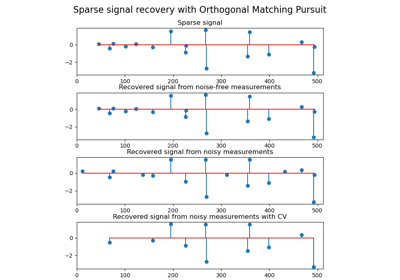sklearn.linear_model.OrthogonalMatchingPursuit¶
- class sklearn.linear_model.OrthogonalMatchingPursuit(*, n_nonzero_coefs=None, tol=None, fit_intercept=True, precompute='auto')[source]¶
Orthogonal Matching Pursuit model (OMP).
Read more in the User Guide.
- Parameters:
- n_nonzero_coefsint, default=None
Desired number of non-zero entries in the solution. If None (by default) this value is set to 10% of n_features.
- tolfloat, default=None
Maximum squared norm of the residual. If not None, overrides n_nonzero_coefs.
- fit_interceptbool, default=True
Whether to calculate the intercept for this model. If set to false, no intercept will be used in calculations (i.e. data is expected to be centered).
- precompute‘auto’ or bool, default=’auto’
Whether to use a precomputed Gram and Xy matrix to speed up calculations. Improves performance when n_targets or n_samples is very large. Note that if you already have such matrices, you can pass them directly to the fit method.
- Attributes:
- coef_ndarray of shape (n_features,) or (n_targets, n_features)
Parameter vector (w in the formula).
- intercept_float or ndarray of shape (n_targets,)
Independent term in decision function.
- n_iter_int or array-like
Number of active features across every target.
- n_nonzero_coefs_int
The number of non-zero coefficients in the solution. If
n_nonzero_coefsis None andtolis None this value is either set to 10% ofn_featuresor 1, whichever is greater.- n_features_in_int
Number of features seen during fit.
New in version 0.24.
- feature_names_in_ndarray of shape (
n_features_in_,) Names of features seen during fit. Defined only when
Xhas feature names that are all strings.New in version 1.0.
See also
orthogonal_mpSolves n_targets Orthogonal Matching Pursuit problems.
orthogonal_mp_gramSolves n_targets Orthogonal Matching Pursuit problems using only the Gram matrix X.T * X and the product X.T * y.
lars_pathCompute Least Angle Regression or Lasso path using LARS algorithm.
LarsLeast Angle Regression model a.k.a. LAR.
LassoLarsLasso model fit with Least Angle Regression a.k.a. Lars.
sklearn.decomposition.sparse_encodeGeneric sparse coding. Each column of the result is the solution to a Lasso problem.
OrthogonalMatchingPursuitCVCross-validated Orthogonal Matching Pursuit model (OMP).
Notes
Orthogonal matching pursuit was introduced in G. Mallat, Z. Zhang, Matching pursuits with time-frequency dictionaries, IEEE Transactions on Signal Processing, Vol. 41, No. 12. (December 1993), pp. 3397-3415. (https://www.di.ens.fr/~mallat/papiers/MallatPursuit93.pdf)
This implementation is based on Rubinstein, R., Zibulevsky, M. and Elad, M., Efficient Implementation of the K-SVD Algorithm using Batch Orthogonal Matching Pursuit Technical Report - CS Technion, April 2008. https://www.cs.technion.ac.il/~ronrubin/Publications/KSVD-OMP-v2.pdf
Examples
>>> from sklearn.linear_model import OrthogonalMatchingPursuit >>> from sklearn.datasets import make_regression >>> X, y = make_regression(noise=4, random_state=0) >>> reg = OrthogonalMatchingPursuit().fit(X, y) >>> reg.score(X, y) 0.9991... >>> reg.predict(X[:1,]) array([-78.3854...])
Methods
fit(X, y)Fit the model using X, y as training data.
Get metadata routing of this object.
get_params([deep])Get parameters for this estimator.
predict(X)Predict using the linear model.
score(X, y[, sample_weight])Return the coefficient of determination of the prediction.
set_params(**params)Set the parameters of this estimator.
set_score_request(*[, sample_weight])Request metadata passed to the
scoremethod.- fit(X, y)[source]¶
Fit the model using X, y as training data.
- Parameters:
- Xarray-like of shape (n_samples, n_features)
Training data.
- yarray-like of shape (n_samples,) or (n_samples, n_targets)
Target values. Will be cast to X’s dtype if necessary.
- Returns:
- selfobject
Returns an instance of self.
- get_metadata_routing()[source]¶
Get metadata routing of this object.
Please check User Guide on how the routing mechanism works.
- Returns:
- routingMetadataRequest
A
MetadataRequestencapsulating routing information.
- get_params(deep=True)[source]¶
Get parameters for this estimator.
- Parameters:
- deepbool, default=True
If True, will return the parameters for this estimator and contained subobjects that are estimators.
- Returns:
- paramsdict
Parameter names mapped to their values.
- predict(X)[source]¶
Predict using the linear model.
- Parameters:
- Xarray-like or sparse matrix, shape (n_samples, n_features)
Samples.
- Returns:
- Carray, shape (n_samples,)
Returns predicted values.
- score(X, y, sample_weight=None)[source]¶
Return the coefficient of determination of the prediction.
The coefficient of determination \(R^2\) is defined as \((1 - \frac{u}{v})\), where \(u\) is the residual sum of squares
((y_true - y_pred)** 2).sum()and \(v\) is the total sum of squares((y_true - y_true.mean()) ** 2).sum(). The best possible score is 1.0 and it can be negative (because the model can be arbitrarily worse). A constant model that always predicts the expected value ofy, disregarding the input features, would get a \(R^2\) score of 0.0.- Parameters:
- Xarray-like of shape (n_samples, n_features)
Test samples. For some estimators this may be a precomputed kernel matrix or a list of generic objects instead with shape
(n_samples, n_samples_fitted), wheren_samples_fittedis the number of samples used in the fitting for the estimator.- yarray-like of shape (n_samples,) or (n_samples, n_outputs)
True values for
X.- sample_weightarray-like of shape (n_samples,), default=None
Sample weights.
- Returns:
- scorefloat
\(R^2\) of
self.predict(X)w.r.t.y.
Notes
The \(R^2\) score used when calling
scoreon a regressor usesmultioutput='uniform_average'from version 0.23 to keep consistent with default value ofr2_score. This influences thescoremethod of all the multioutput regressors (except forMultiOutputRegressor).
- set_params(**params)[source]¶
Set the parameters of this estimator.
The method works on simple estimators as well as on nested objects (such as
Pipeline). The latter have parameters of the form<component>__<parameter>so that it’s possible to update each component of a nested object.- Parameters:
- **paramsdict
Estimator parameters.
- Returns:
- selfestimator instance
Estimator instance.
- set_score_request(*, sample_weight: bool | None | str = '$UNCHANGED$') OrthogonalMatchingPursuit[source]¶
Request metadata passed to the
scoremethod.Note that this method is only relevant if
enable_metadata_routing=True(seesklearn.set_config). Please see User Guide on how the routing mechanism works.The options for each parameter are:
True: metadata is requested, and passed toscoreif provided. The request is ignored if metadata is not provided.False: metadata is not requested and the meta-estimator will not pass it toscore.None: metadata is not requested, and the meta-estimator will raise an error if the user provides it.str: metadata should be passed to the meta-estimator with this given alias instead of the original name.
The default (
sklearn.utils.metadata_routing.UNCHANGED) retains the existing request. This allows you to change the request for some parameters and not others.New in version 1.3.
Note
This method is only relevant if this estimator is used as a sub-estimator of a meta-estimator, e.g. used inside a
Pipeline. Otherwise it has no effect.- Parameters:
- sample_weightstr, True, False, or None, default=sklearn.utils.metadata_routing.UNCHANGED
Metadata routing for
sample_weightparameter inscore.
- Returns:
- selfobject
The updated object.
